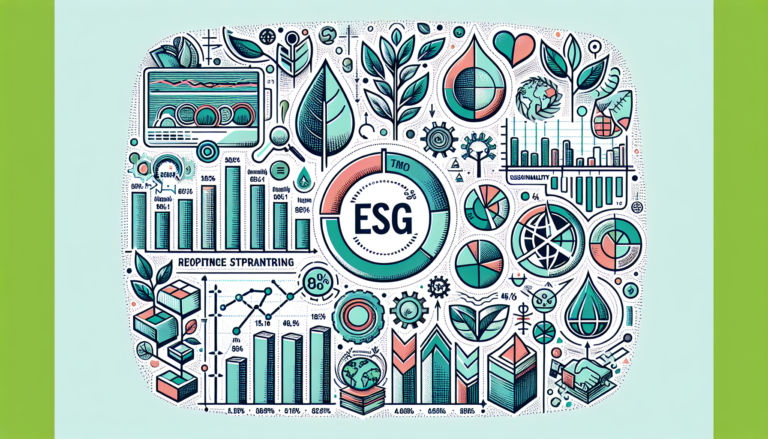Exploring the benefits of esg index funds for investors
ESG index funds are investment vehicles prioritizing companies with strong environmental, social, and governance practices, allowing investors to align their portfolios with sustainable values while seeking competitive financial returns.
ESG index funds are gaining traction among investors seeking sustainable and socially responsible investment options. But what exactly are they and how can they impact your portfolio? Let’s delve into the details.
What are esg index funds?
ESG index funds are investment funds that prioritize companies and assets with strong performance on environmental, social, and governance (ESG) criteria. These funds aim to provide investors with a way to align their investment portfolios with their values while still seeking financial returns.
These funds track specific indexes that include only companies meeting certain ESG standards. Investors in ESG index funds can support sustainable practices, such as reducing carbon emissions and promoting fair labor practices, while potentially enjoying profits.
Understanding ESG Criteria
The ESG criteria used to evaluate companies can vary, but generally include:
- Environmental: Assessing a company’s impact on the planet, including carbon emissions, waste management, and resource conservation.
- Social: Evaluating how a company manages relationships with employees, suppliers, and the communities where it operates.
- Governance: Analyzing a company’s leadership, executive pay, audits, and shareholder rights.
By investing in ESG index funds, individuals can make investment choices that reflect their personal values and support ethical business practices.
Key features of esg index funds
ESG index funds have several key features that differentiate them from traditional investment funds. Understanding these features can help investors make informed decisions about their portfolios.
Investment Strategy
These funds invest in companies that meet specific environmental, social, and governance criteria. This strategy aligns financial goals with personal values by focusing on sustainability.
Diversification
ESG index funds often include a wide range of industries, providing diversification which helps reduce risk. By spreading investments across various sectors, investors can protect themselves from market volatility.
Passive Management
Typically, ESG index funds follow a passive management approach. This means they aim to replicate the performance of a specific index rather than actively selecting individual stocks. Passive management often leads to lower fees and expenses.
Transparency
These funds usually provide transparency about their holdings and criteria for selecting investments. Investors can easily find information about which companies are included and how they meet ESG standards.
Performance
Many studies have shown that ESG index funds can perform just as well, if not better, than traditional funds. By investing in companies that prioritize sustainability, investors may benefit from long-term growth.
As global awareness of sustainability increases, ESG index funds are becoming a popular choice among investors looking to contribute positively to society while also achieving financial returns.
Benefits of investing in esg index funds
Investing in ESG index funds comes with numerous benefits that appeal to both individual and institutional investors. Understanding these advantages is crucial for making informed investment decisions.
Alignment with Values
One main benefit of ESG index funds is that they allow investors to align their portfolios with their personal values. By choosing funds that prioritize environmental, social, and governance issues, investors can support companies that work towards positive societal and environmental changes.
Potential for Strong Returns
Research suggests that ESG index funds can offer competitive returns over time. Companies that practice good governance and sustainability often exhibit lower risks and better long-term financial performance, which can lead to solid investment outcomes.
Market Demand
With increased demand for socially responsible investing, ESG index funds are becoming more popular among retail and institutional investors. This rising interest can drive up the value of these funds and enhance investor returns.
Risk Management
ESG factors play a key role in identifying potential risks associated with investments. By focusing on companies with strong ESG practices, investors may mitigate risks related to environmental regulations, social unrest, or governance failures.
Access to Information
ESG index funds often provide transparency regarding the companies within the fund. Investors can easily access information on how these firms are performing in terms of sustainability and accountability, allowing for educated investment choices.
In summary, ESG index funds offer investors a chance to earn financial returns while promoting responsible business practices and contributing to a better future.
How to choose the right esg index fund
Choosing the right ESG index fund involves several key considerations to ensure it aligns with your financial goals and values. Here are some important factors to keep in mind.
Identify Your Investment Goals
Begin by determining your investment objectives. Are you looking for long-term growth, immediate income, or a balance of both? Knowing your goals will help narrow down your options among various ESG index funds.
Research Fund Performance
Look into the historical performance of potential ESG index funds. While past performance is not a guarantee of future results, it can provide insight into how the fund has reacted during different market conditions.
Evaluate ESG Criteria
Understand the specific ESG criteria used by each fund. Different funds may vary in what they consider important. For example, some may prioritize environmental issues, while others focus more on social or governance factors. Ensure the fund’s criteria align with your values.
Review Fund Fees
Examine the fees associated with the ESG index funds you’re considering. Lower fees can enhance your overall returns over time. Compare the expense ratios and any additional costs to find a cost-effective option.
Check Fund Holdings
Take a closer look at the companies included in the fund. Consider whether you are comfortable investing in those firms and if they align with your personal preferences. Reviewing the fund’s holdings can give you a clearer picture of its focus.
Seek Professional Advice
If you feel uncertain about selecting the right ESG index fund, consider consulting a financial advisor. They can provide tailored advice based on your individual financial situation and investment goals.
Risks associated with esg index funds
While ESG index funds offer many benefits, they also come with certain risks that investors should be aware of. Understanding these risks can help in making informed investment decisions.
Market Risk
Like all investments, ESG index funds are subject to market risk. Changes in market conditions, economic downturns, or shifts in investor sentiment can impact the performance of the fund. This means that even well-rated ESG companies can experience significant declines in their stock prices.
ESG Rating Differences
ESG ratings can vary widely across different rating agencies. This lack of standardization can create confusion about what constitutes a truly sustainable investment. Investors might find themselves investing in funds that do not align with their values based on misleading ratings.
Liquidity Risk
Some ESG index funds may face liquidity risk. This occurs when investors cannot easily buy or sell shares without affecting the price significantly. Limited trading volumes in some niche ESG sectors can lead to challenges when trying to exit an investment.
Concentration Risk
Many ESG index funds might concentrate their investments in certain industries, like renewable energy or technology. This can lead to concentration risk, where poor performance in that sector can heavily impact the overall fund performance. Diversifying between different sectors can help mitigate this risk.
Regulatory Risk
The regulatory environment surrounding ESG investing is continually evolving. Changes in laws and regulations can impact how ESG funds operate, potentially affecting their returns. Keeping up with these changes is essential for investors in ESG index funds.
By being aware of these risks, investors can better navigate the landscape of ESG index funds and make choices that align with both their financial and ethical objectives.
Future trends in esg investing
The landscape of ESG investing is changing rapidly, and several trends are shaping its future. Understanding these trends can help investors stay ahead and make informed decisions.
Increased Demand for Transparency
Investors are increasingly demanding transparency in how companies report their ESG performance. This push for clearer metrics will likely lead to more standardized reporting practices across industries, allowing investors to make better comparisons and decisions.
Focus on Climate Action
As concerns about climate change grow, ESG investing is placing a greater emphasis on companies that demonstrate a commitment to sustainability. Investments in renewable energy and resource-efficient technologies are expected to rise significantly.
Integration with Traditional Investment Strategies
More asset managers are integrating ESG factors into their traditional investment strategies. This means that ESG considerations will become standard practice rather than a niche area. Investors will increasingly consider these factors alongside financial metrics.
Rise of Thematic Funds
There is a growing trend towards thematic funds that focus on specific ESG issues, such as gender equality, clean water access, or sustainable agriculture. These funds allow investors to target specific causes they are passionate about while still achieving financial goals.
Use of Technology and AI
Technology, including artificial intelligence, is playing a larger role in ESG investing. AI can help analyze vast amounts of data to assess ESG risks and identify opportunities. This will make it easier for investors to evaluate companies’ sustainability practices.
By keeping an eye on these trends, investors can adapt their strategies to align with the evolving landscape of ESG investing, ensuring they remain relevant and impactful.
In summary, the future of ESG investing looks promising
As more investors seek to align their portfolios with their values, ESG index funds are gaining popularity. The trends we discussed, such as the demand for transparency, a focus on climate action, and the integration of technology, are paving the way for a more sustainable investment landscape.
By understanding these developments, investors can make informed decisions and embrace opportunities that not only benefit their financial goals but also contribute positively to society and the environment.
Ultimately, staying informed about ESG trends can help investors navigate this evolving field and support a more sustainable future.
Frequently Asked Questions
What are ESG index funds?
ESG index funds are investment funds that prioritize companies with strong environmental, social, and governance practices, aiming to align financial goals with ethical values.
How can I benefit from investing in ESG index funds?
Investing in ESG index funds allows you to support sustainable practices while potentially achieving solid financial returns, as these companies often show resilience and long-term growth.
What are the risks associated with ESG index funds?
Risks can include market volatility, differing ESG ratings, liquidity issues, and concentration in specific sectors, which can affect the overall performance of the fund.
How do I choose the right ESG index fund?
Consider your investment goals, research fund performance, evaluate ESG criteria, review fees, and check fund holdings to ensure alignment with your values.
What future trends should I watch in ESG investing?
Future trends include increased transparency demands, a focus on climate action, integration with traditional strategies, and the rise of thematic funds targeting specific issues.
Can technology improve ESG investing?
Yes, technology, including AI, is enhancing ESG investing by enabling better data analysis and risk assessments, making it easier for investors to evaluate sustainability practices.






